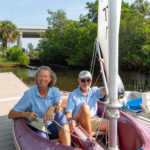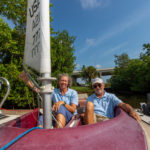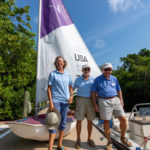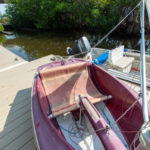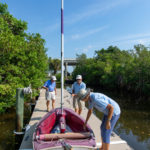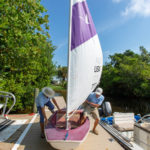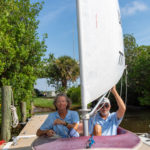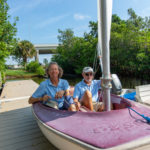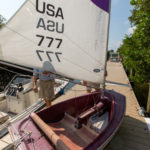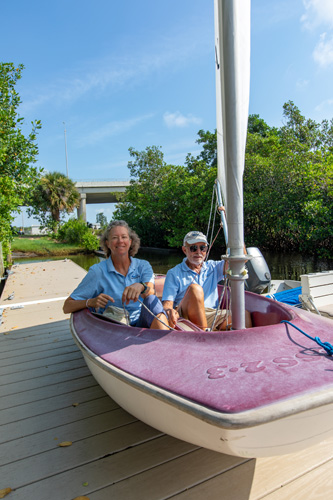
The Youth Sailing Foundation has taken the aphorism of activist Bertha Calloway to heart: “We cannot direct the wind, but we can adjust the sails.” In that same vein, the nonprofit has continually adjusted its sails since being founded in 2009, most recently by adding an Adaptive Sailing program to its already full roster.
The organization piloted a program for novice sailors last fall, introducing the sport to special needs clients from the Arc of Indian River County and local Special Olympics Florida participants.
The addition in 2018 of access points such as an ADA-compliant gangway and floating docks has enabled the YSF crew to provide safe access to the Indian River Lagoon where they can utilize a fleet of three specially designed sailboats donated in 2017 by YSF volunteer Dick Gates.
The unique boats, built in Australia, are highly engineered to not capsize. They have a joystick instead of a tiller, which makes steering intuitive, a deep centerboard, side by side seating, and canvas bucket seats that are positioned down low with high topsides.
The sailboats are designed for sailors with physical, emotional or cognitive impairments and allow for a skilled first mate to co-pilot the boat with the fledgling mariners. Sailors, ranging in age from 14 to 61, set sail weekly from October through April, tying off the season with a perfect sailors’ knot at an adaptive regatta in Naples.
Therapeutic marine-related experiences have been proven to be beneficial to everyone and this program can level the playing field for those with physical and developmental challenges who may not otherwise have the opportunity to experience the calming effects of being on the water.
Participants in the initial YSF Adaptive Sailing class included sailors with disabilities ranging from limited mobility as a result of varying degrees of paralysis, to autism and Down syndrome.
“It was an immediate hit,” says Stu Keiller, YSF executive director. “We had 100 percent attendance; nobody wanted to miss. It’s calming and therapeutic in the sense that it focuses the mind totally outside of the normal daily routine.”
“YSF is offering a benefit that avails most of the individuals who we service an opportunity that they have never experienced,” says Heather Dales, Arc of IRC executive director. “They loved it! They’ve made new friends, increased their self-esteem, became even more integrated into the community, and it exposed them to new ideas and experiences.”
“There’s something unique about a sailboat,” adds Keiller, an avid sailor himself. “When you sheet home the sails (bring in the sails) and the wind actually starts to drive the boat, the boat heels over, leans over and suddenly you’re scooting along in total silence. You’re in control; not some engine. The experience itself is unique, and for many, it’s the only time they feel like they are the one who is in control. It’s something people want to go back to time and time again.”
The sailors can tackle the experience solo or with family and friends, as the program is adaptable to an individual’s level of comfort and ability. Initially, these special sailors take their maiden voyage with trained instructors at their side. Some are then able to sail with tandem support or even on their own, leaving landlubbers behind after obtaining confidence in their seafaring skills.
“Sailing is a sport that you can do individually or with others, and the student can determine the environment they want to sail in,” adds assistant sailing director, Kym Helwig, who directs the Adaptive Sailing program. “One student with a neurological disability was nervous about sailing and tried to talk his father out of it. By the end of the first session, he was so comfortable that he fell asleep on the instructor’s shoulder.”
In addition to her credentials as a certified sailing instructor, Helwig has a background in education with a focus on special education. Keiller says they sent her to an adaptive sailing seminar, making her uniquely qualified to run the program.
The benefits of sailing are numerous, contributing to increased confidence, a sense of freedom and a strong sense of self. Its psychosocial benefits include improvements to emotional, physical, cognitive, social and motor skills functions.
Nearly all of the participants in the pilot program ended up sailing solo. By day two, Marcy Bobell, a 45-year-old sailor with Down syndrome, was chomping at the bit to sail alone. She has since progressed with her sailing skills, took private lessons over the summer and wants to move up to the “big” boats.
“Forget the ‘dis’ on disability. Strive for the abilities that they’ve got,” says Marcy’s mother, Deborah Bobell. “She loves anything to do with the water and has participated in the Special Olympics since she was 9. Marcy swims, does Pilates, paddleboards, surfs, does CrossFit, yoga and now she sails.”
Bobell says that the adaptive program provides an opportunity to show people “just how much these kids can do. We have not allowed Marcy’s disability to limit what she can do. Marcy understands she’s different, but by offering programs like this, she’s not really that different. She can do it.”
Gates had also donated a pontoon boat which has provided the added benefit of allowing caregivers to position themselves nearby, in case any novice sailors need them for extra moral support.
“The pontoon boat will also allow service dogs to be nearby as well,” notes Keiller, who hopes to entice local veterans out onto the water on Mondays this fall.
The initial Adaptive Sailing program, free to qualified Indian River County residents, was so successful, YSF plans to start additional classes Sept. 30. They have been able to double the size of the program through a generous grant from the John’s Island Community Service League.
For more information, visit ysfirc.org or contact Kym Helwig at k.helwig@ysfirc.org.
The Youth Sailing Foundation has taken the aphorism of activist Bertha Calloway to heart: “We cannot direct the wind, but we can adjust the sails.” In that same vein, the nonprofit has continually adjusted its sails since being founded in 2009, most recently by adding an Adaptive Sailing program to its already full roster.
The organization piloted a program for novice sailors last fall, introducing the sport to special needs clients from the Arc of Indian River County and local Special Olympics Florida participants.
The addition in 2018 of access points such as an ADA-compliant gangway and floating docks has enabled the YSF crew to provide safe access to the Indian River Lagoon where they can utilize a fleet of three specially designed sailboats donated in 2017 by YSF volunteer Dick Gates.
The unique boats, built in Australia, are highly engineered to not capsize. They have a joystick instead of a tiller, which makes steering intuitive, a deep centerboard, side by side seating, and canvas bucket seats that are positioned down low with high topsides.
The sailboats are designed for sailors with physical, emotional or cognitive impairments and allow for a skilled first mate to co-pilot the boat with the fledgling mariners. Sailors, ranging in age from 14 to 61, set sail weekly from October through April, tying off the season with a perfect sailors’ knot at an adaptive regatta in Naples.
Therapeutic marine-related experiences have been proven to be beneficial to everyone and this program can level the playing field for those with physical and developmental challenges who may not otherwise have the opportunity to experience the calming effects of being on the water.
Participants in the initial YSF Adaptive Sailing class included sailors with disabilities ranging from limited mobility as a result of varying degrees of paralysis, to autism and Down syndrome.
“It was an immediate hit,” says Stu Keiller, YSF executive director. “We had 100 percent attendance; nobody wanted to miss. It’s calming and therapeutic in the sense that it focuses the mind totally outside of the normal daily routine.”
“YSF is offering a benefit that avails most of the individuals who we service an opportunity that they have never experienced,” says Heather Dales, Arc of IRC executive director. “They loved it! They’ve made new friends, increased their self-esteem, became even more integrated into the community, and it exposed them to new ideas and experiences.”
“There’s something unique about a sailboat,” adds Keiller, an avid sailor himself. “When you sheet home the sails (bring in the sails) and the wind actually starts to drive the boat, the boat heels over, leans over and suddenly you’re scooting along in total silence. You’re in control; not some engine. The experience itself is unique, and for many, it’s the only time they feel like they are the one who is in control. It’s something people want to go back to time and time again.”
The sailors can tackle the experience solo or with family and friends, as the program is adaptable to an individual’s level of comfort and ability. Initially, these special sailors take their maiden voyage with trained instructors at their side. Some are then able to sail with tandem support or even on their own, leaving landlubbers behind after obtaining confidence in their seafaring skills.
“Sailing is a sport that you can do individually or with others, and the student can determine the environment they want to sail in,” adds assistant sailing director, Kym Helwig, who directs the Adaptive Sailing program. “One student with a neurological disability was nervous about sailing and tried to talk his father out of it. By the end of the first session, he was so comfortable that he fell asleep on the instructor’s shoulder.”
In addition to her credentials as a certified sailing instructor, Helwig has a background in education with a focus on special education. Keiller says they sent her to an adaptive sailing seminar, making her uniquely qualified to run the program.
The benefits of sailing are numerous, contributing to increased confidence, a sense of freedom and a strong sense of self. Its psychosocial benefits include improvements to emotional, physical, cognitive, social and motor skills functions.
Nearly all of the participants in the pilot program ended up sailing solo. By day two, Marcy Bobell, a 45-year-old sailor with Down syndrome, was chomping at the bit to sail alone. She has since progressed with her sailing skills, took private lessons over the summer and wants to move up to the “big” boats.
“Forget the ‘dis’ on disability. Strive for the abilities that they’ve got,” says Marcy’s mother, Deborah Bobell. “She loves anything to do with the water and has participated in the Special Olympics since she was 9. Marcy swims, does Pilates, paddleboards, surfs, does CrossFit, yoga and now she sails.”
Bobell says that the adaptive program provides an opportunity to show people “just how much these kids can do. We have not allowed Marcy’s disability to limit what she can do. Marcy understands she’s different, but by offering programs like this, she’s not really that different. She can do it.”
Gates had also donated a pontoon boat which has provided the added benefit of allowing caregivers to position themselves nearby, in case any novice sailors need them for extra moral support.
“The pontoon boat will also allow service dogs to be nearby as well,” notes Keiller, who hopes to entice local veterans out onto the water on Mondays this fall.
The initial Adaptive Sailing program, free to qualified Indian River County residents, was so successful, YSF plans to start additional classes Sept. 30. They have been able to double the size of the program through a generous grant from the John’s Island Community Service League.
For more information, visit ysfirc.org or contact Kym Helwig at k.helwig@ysfirc.org.
Photos by: Denise Ritchie
Click HERE to see more or buy photos
- Kym Helwig and Dick Gates
- Kym Helwig and Dick Gates
- Kym Helwig, Dick Gates and Stu Keiller
- YSF adaptive sailing program provides a two-person sling seat and joystick rudder
- Stu Keiller, Dick Gates, and Kym Helwig
- Kym Helwig and Dick Gates
- Kym Helwig and Dick Gates
- Kym Helwig and Dick Gates
- YSF adaptive sailing program provides a two-person sling seat and joystick rudder

